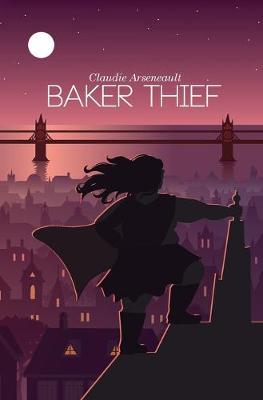I picked this up because it combined a baker and a fantasy mystery. There really isn't as much baking content as I would have liked because Claude the baker is off being a superhero and keeps needing to close the bakery.
What I Liked:
- This is a fantasy world based in a French worldview. The author is from Quebec and it shows in the French blended into this story. I don't know that I've seen another book where this is so well combined. Place names, official titles, etc are French.
- There are witches in this world but they have been driven underground by persecution in the fairly recent past. Nonmagical people think they are safe now because witches are gone. Witches are not gone.
- The main character is Claude/Claire. They are genderfluid. Generally, he is Claude during the day when he is baking and Claire at night when she is a thief. That schedule of genders was working well until recently when Claude is starting to regret not being comfortable working during the day as Claire or spending the night as Claude depending on which gender feels most comfortable at the time.
- It tackles issues relating to aromanticism and asexuality. There are several characters at different places on the spectrum of aromanticism and asexuality so you don't get a single point of view of these topics. It shows how aromantic people have relationships which is important if readers aren't familiar with this aspect of queerness.
- The rest of the cast is also very diverse. Many genders, sexualities, disabilities, and races are represented. It is also very good at body acceptance of various sizes of people.
Things that are slightly off:
- This isn't the author's fault but there is a major part of the plot that is very similar to part of the plot of Witchmark. I loved that book so much and I read it first, so what should have felt like a surprising plot point felt like, "Oh, this again?" The books came out about just about the same time so it is just a coincidence but it decreased my enjoyment a bit.
Things that I'll probably get yelled at on the internet for criticizing:
- Sometimes the supporting characters were very awkwardly introduced. The author was working hard to include characters from many different backgrounds which is good but it turned every character introduction into a descriptive list. It is a case of telling the reader instead of showing the reader through the character's actions. For example, you wouldn't necessarily be told when being introduced to your new boss what her sexual orientation was or that she was polyamorous. Maybe you would see pictures on her desk or it would come up in conversation later.
- Sometimes the plot seemed to be set aside in order for a lesson about identity. The worst instance of this was when Claire ran into a burning building, past a female-presenting witch who was setting the place on fire, and into a room where other witches were being held captive, in order to rescue them. The witches inside ask their friend is ok. Claire refers to her as "Fire girl" in her explanation. At that point, she is informed that the witch is agender and not a girl. My thought reading that passage was, "This is why conservatives laugh at us." You are being rescued from a building that is literally on fire. You were trapped and needed a person with super strength to get you out. Now, while the fire is about to drop the whole ceiling on you, you take the time to admonish your rescuer for misgendering a person they literally saw in passing. Run first - then figure out the proper pronouns of strangers you've never spoken to. This book sometimes felt like an educational tome on identity more than a fantasy story. That's fine if that was the author's goal but I would have liked to see both aspects blended together more seamlessly.
This review was originally posted on Based On A True Story
